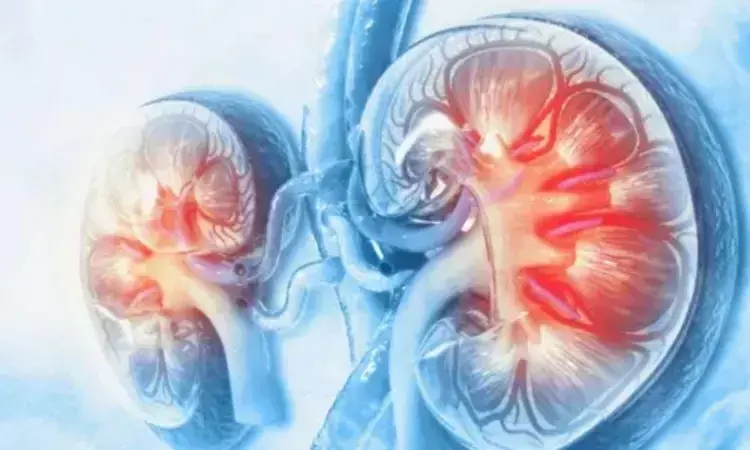- Home
- Medical news & Guidelines
- Anesthesiology
- Cardiology and CTVS
- Critical Care
- Dentistry
- Dermatology
- Diabetes and Endocrinology
- ENT
- Gastroenterology
- Medicine
- Nephrology
- Neurology
- Obstretics-Gynaecology
- Oncology
- Ophthalmology
- Orthopaedics
- Pediatrics-Neonatology
- Psychiatry
- Pulmonology
- Radiology
- Surgery
- Urology
- Laboratory Medicine
- Diet
- Nursing
- Paramedical
- Physiotherapy
- Health news
- Fact Check
- Bone Health Fact Check
- Brain Health Fact Check
- Cancer Related Fact Check
- Child Care Fact Check
- Dental and oral health fact check
- Diabetes and metabolic health fact check
- Diet and Nutrition Fact Check
- Eye and ENT Care Fact Check
- Fitness fact check
- Gut health fact check
- Heart health fact check
- Kidney health fact check
- Medical education fact check
- Men's health fact check
- Respiratory fact check
- Skin and hair care fact check
- Vaccine and Immunization fact check
- Women's health fact check
- AYUSH
- State News
- Andaman and Nicobar Islands
- Andhra Pradesh
- Arunachal Pradesh
- Assam
- Bihar
- Chandigarh
- Chattisgarh
- Dadra and Nagar Haveli
- Daman and Diu
- Delhi
- Goa
- Gujarat
- Haryana
- Himachal Pradesh
- Jammu & Kashmir
- Jharkhand
- Karnataka
- Kerala
- Ladakh
- Lakshadweep
- Madhya Pradesh
- Maharashtra
- Manipur
- Meghalaya
- Mizoram
- Nagaland
- Odisha
- Puducherry
- Punjab
- Rajasthan
- Sikkim
- Tamil Nadu
- Telangana
- Tripura
- Uttar Pradesh
- Uttrakhand
- West Bengal
- Medical Education
- Industry
Abnormal lactate metabolism tied to kidney injury and albuminuria in diabetic nephropathy

Singapore: A recent study has revealed that kidney metabolic disruptions resulting in enhanced lactate generation contribute to the pathogenesis of diabetic nephropathy (DN).
The findings, published in Kidney International, suggest that increased urinary lactate levels may be a potential biomarker for the risk of kidney disease progression.
"Disrupted kidney metabolism is a key driver of progressive kidney injury in diabetic kidney disease (DKD)," researchers state in the study. "The findings shed light on metabolic abnormalities associated with kidney damage in diabetes and point to potentially improved ways of detecting risk for kidney failure."
DKD is a major cause of kidney failure in Singapore where, on average, nine people are diagnosed with kidney failure every day-up to 40 per cent of individuals with longstanding diabetes will eventually develop kidney disease.
This new study is part of the Diabetes Study in Nephropathy and other Microvascular Complications (DYNAMO), a global collaborative study involving clinicians and scientists from six countries and 25 institutions with the overall aim of reducing the prevalence of DKD. The research team combined experiments conducted on a preclinical model with analysis of clinical data and samples from a Singaporean cohort of 230 patients with type 2 diabetes.
"We found abnormal metabolism resulting in accumulation of lactate, a by-product of cellular energy production, that appears to derive from impaired function of mitochondria in kidney tubule cells," said lead author Assistant Professor Kengo Azushima, a nephrologist with Yokohama City University Graduate School of Medicine and Duke-NUS. "Lactate levels were tightly linked with albumin in the urine, which is a marker of kidney damage, suggesting lactate may be a signal of distress caused by high levels of protein in the urine."
Treatment with angiotensin receptor blockers (ARBs), a common therapy for DKD, reversed metabolic abnormalities and prevented kidney injury in the preclinical model. Among the patients, those with the highest urinary lactate levels were at significantly increased risk of eventual kidney failure.
"Monitoring urinary lactate could help predict prognosis and guide management in diabetic kidney disease," commented nephrologist Professor Thomas Coffman, a senior author of the study from the Duke-NUS Cardiovascular & Metabolic Disorders Programme, and Lead Principal Investigator of DYNAMO. "Our findings indicate optimising kidney energy metabolism may be important for slowing disease progression."
“By teasing out specific defects in renal energy pathways linked to diabetic kidney disease, this work brings us closer to precision interventions that tackle underlying disease drivers. I am hopeful future research can build on these insights to develop innovative prevention strategies,” said co-senior author Associate Professor Lim Su Chi, Senior Consultant, Diabetes Centre, Admiralty Medical Centre, and Clinical Director, Clinical Research Unit, Khoo Teck Puat Hospital.
"This study provides new insights into mechanisms driving progressive kidney disease in diabetes," said Prof Coffman, who is also Dean of Duke-NUS. "It illustrates the strength of leveraging basic science approaches with human translational research to uncover mechanistic pathways underlying major health conditions like diabetic kidney disease."
The researchers plan follow-up studies to explore lactate itself as a possible cause of kidney injury. If successful, reducing kidney lactate generation or blocking its effects could suggest novel therapeutic approaches to prevent DKD.
Reference:
Kengo Azushima, Jean-Paul Kovalik, Takahiro Yamaji, Jianhong Ching, Tze Wei Chng, Jing Guo, Jian-Jun Liu, Mien Nguyen, Rashidah Binte Sakban, Simi E. George, Puay Hoon Tan, Su Chi Lim, Susan B. Gurley, Thomas M. Coffman, Abnormal lactate metabolism is linked to albuminuria and kidney injury in diabetic nephropathy, DOI:https://doi.org/10.1016/j.kint.2023.08.006.
Dr Kamal Kant Kohli-MBBS, DTCD- a chest specialist with more than 30 years of practice and a flair for writing clinical articles, Dr Kamal Kant Kohli joined Medical Dialogues as a Chief Editor of Medical News. Besides writing articles, as an editor, he proofreads and verifies all the medical content published on Medical Dialogues including those coming from journals, studies,medical conferences,guidelines etc. Email: drkohli@medicaldialogues.in. Contact no. 011-43720751


